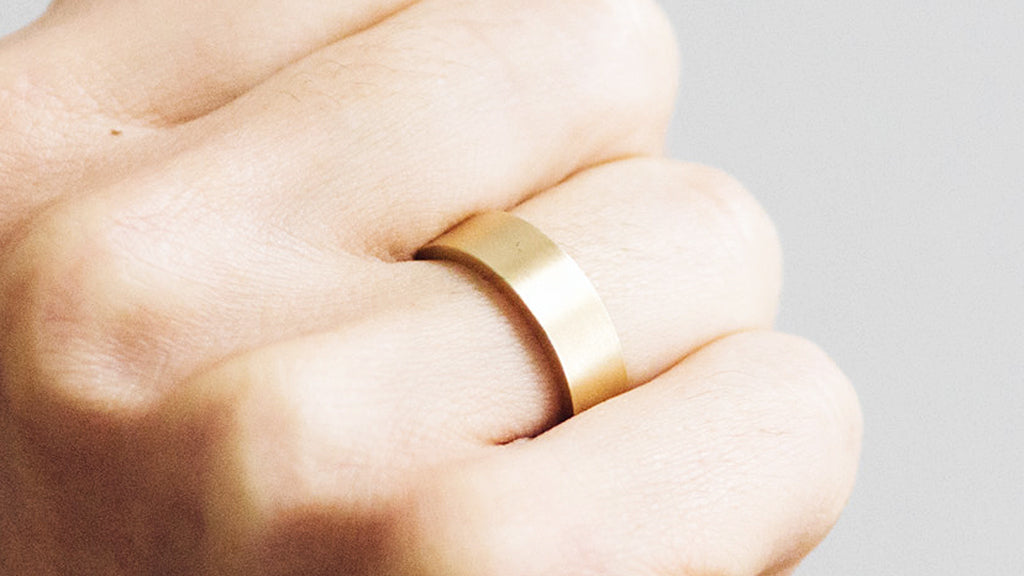Your Cart is Empty
We’re often approached by fraught customers whose wedding bands have lost their zest. "Is it normal for wedding rings to get scratched?," they ask us. The simple answer is, yes.
Not even the toughest of precious metals is invincible. If you’ve commemorated your commitment with a hand-crafted Lebrusan Studio ring, we can assure you that the wear it shows is not a defect or an issue of quality. All of our gold wedding bands are hallmarked by London’s Assay Office, assuring that their carat weight and alloy metal quantities meet the universal criteria. No matter where you buy a piece of jewellery from, the quality and density of all hallmarked 9ct, 14ct and 18ct gold is the same.
The marks on your ring are, in fact, reminders of its unique journey. Scratches are a natural feature of ‘forever’ jewellery and many people love their wedding rings just the way they are, scuffs and all, because their imperfections tell a story.
If the ‘well-loved’ look isn’t for you, however, there are options. We can’t promise that we can restore your scratched band to its factory settings, but provided it's not worn beyond repair, we can probably show it enough love to regain some of its familiar old shine.

Generally speaking, there are two factors that contribute to the rate at which your wedding ring gets marked; its metal type and what it comes into contact with.
It's also about what you do with your ring on – day-to-day tasks like washing the dishes, carrying a suitcase, gardening or closing the car door can all leave scrapes. In our experience, the main culprit for ring-scratching is other metals; think keys or door handles.
People often think that wedding rings are indestructible. Unfortunately, no matter how careful you are, yours will inevitably show some wear over time. However, it is possible to avoid serious damage by always taking off your wedding ring before going to the gym, carrying out housework or doing any manual labour.

To keep your wedding ring looking its healthiest, we recommend giving it a rub with a polishing cloth every once in a while. You can also treat it to the occasional home clean using warm water, washing-up liquid and a children’s toothbrush – because these ones have the softest bristles! Avoid boiling water or being too heavy-handed.
 Our D-Shaped Beloved Diamond wedding band in 2mm and 3mm band widths
Our D-Shaped Beloved Diamond wedding band in 2mm and 3mm band widths
If you’ve noticed some scratches that are bothering you, we might be able to put your mind at rest with our polishing service. We generally wouldn’t recommend having your ring polished too often, especially if delicate engraving is a feature, as a little metal and detail is lifted away every time. However, the occasional polish can buff away shallow scratches and revive some of the ring’s original shine. For this assistance, we charge £40.
Don’t forget, though, that whilst a buff can bring back some of the ring’s old glimmer, fixing damaged engraving or deep scores isn’t as easy.

Plain white gold bands can often benefit from re-plating. White gold is an alloy of yellow gold and other metals, the latter present to contribute a white hue. White gold usually has a slightly yellow tinge, which is why a rhodium plating is applied to deliver its perfect silvery finish. Rhodium plating wears away over time to reveal the slightly yellower metal beneath, but you can easily get your white gold wedding ring re-plated (or 're-dipped') in rhodium every few years. Re-plating doesn’t just restore the gold’s white tint, but can help reduce the appearance of small scratches and revive your ring’s old shine.
Re-plating is a quick and effective fix for plain bands, but again, if your ring is engraved then we discourage a rhodium re-dip. Rhodium plating in the deep grooves of engraved patterns doesn’t wear away at the same rate as the plating on the raised surfaces, resulting in colour inconsistency over time and requiring a high level of upkeep.
In short, our advice is this: treat your wedding ring like you would a newborn baby or an antique vase. Don’t take it with you on gym equipment, climbing walls or building sites! If you avoid exposing your ring to harsh manual activities like these, you can avoid deep-set damage.
Minor scratches caused by other low-key, day-to-day pursuits are inevitable and can be accepted and loved - or easily fixed.
